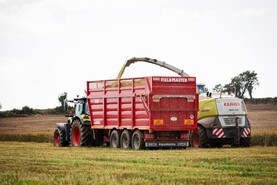Terms used to describe and label meat products, such as steak, sausages and burgers, will no longer be permissible for use on the packaging of plant-based meat alternatives in France, following the passing of a food labelling law there.
The levels of plant protein inclusion in foods, relative to that of animal protein, will determine what can be marketed, labelled and promoted as meat products, the new law states.
The legislation, which will be effective from 1 October this year, has been welcomed by French farmer organisations as a “decisive step” in the transparency of labels on food goods.
However, as plant-based products imported from other EU member states will not be subject to the law, some farm groups have complained that the new rules do not go far enough to protect the marketing of real meat products.
The FNSEA, a large French farmer organisation, said that the new rules "will not avoid any confusion" among French consumers as a result of the importation loophole and invited the French government to "widen the scope" of the new rules to all products.
Consumer trends
The growth of plant-based meat alternatives had grown 49% across the EU over the two years up to 2021, according to the report compiled after an EU-funded SMART PROTEIN project was conducted.
The levels of growth were not even in each member state, ranging from a growth of over 200% on plant-based sales in Germany to a one-tenth drop in revenue for meat alternatives recorded by Italy’s retailers.
Read more
Tesco plant burger advert misleading
Legal papers filed in Beyond Meat US consumer row
Terms used to describe and label meat products, such as steak, sausages and burgers, will no longer be permissible for use on the packaging of plant-based meat alternatives in France, following the passing of a food labelling law there.
The levels of plant protein inclusion in foods, relative to that of animal protein, will determine what can be marketed, labelled and promoted as meat products, the new law states.
The legislation, which will be effective from 1 October this year, has been welcomed by French farmer organisations as a “decisive step” in the transparency of labels on food goods.
However, as plant-based products imported from other EU member states will not be subject to the law, some farm groups have complained that the new rules do not go far enough to protect the marketing of real meat products.
The FNSEA, a large French farmer organisation, said that the new rules "will not avoid any confusion" among French consumers as a result of the importation loophole and invited the French government to "widen the scope" of the new rules to all products.
Consumer trends
The growth of plant-based meat alternatives had grown 49% across the EU over the two years up to 2021, according to the report compiled after an EU-funded SMART PROTEIN project was conducted.
The levels of growth were not even in each member state, ranging from a growth of over 200% on plant-based sales in Germany to a one-tenth drop in revenue for meat alternatives recorded by Italy’s retailers.
Read more
Tesco plant burger advert misleading
Legal papers filed in Beyond Meat US consumer row






 This is a subscriber-only article
This is a subscriber-only article










SHARING OPTIONS: